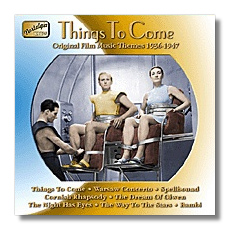
The Internet's Premier Classical Music Source
Related Links
- Latest Reviews
- More Reviews
-
By Composer
-
Collections
DVD & Blu-ray
Books
Concert Reviews
Articles/Interviews
Software
Audio
Search Amazon
Recommended Links
Site News
 CD Review
CD Review
Things to Come

- Arthur Bliss: Things to Come: Excerpts
- William Addinsell: Warsaw Concerto
- Charles Williams:
- The Night Has Eyes
- The Dream of Olwen
- While I Live
- Frank Churchill: Bambi: Musical selection
- Hubert Bath: Cornish Rhapsody
- Nicholas Brodszky: The Way to the Stars: Musical themes
- Miklós Rózsa: Spellbound Concerto
Various performers
Naxos Nostalgia 8.120597 ADD monaural 60:23
This CD of "Original Film Music Themes, 1935-1947" is intended more for the nostalgia buff, particularly English ones, than for collectors whose primary interest is film music. You'll have to buy the CD and open up the booklet to find out who wrote what, and there is a preponderance of "classical pops." You don't have to be older than a Baby Boomer to love the Warsaw Concerto, the Cornish Rhapsody, and the Spellbound Concerto (abbreviated to a telegraphic 3:59 here!), but it helps!
The Things to Come selections will be most attractive to both classical music and film music collectors. This was one of the first commercial releases of symphonic film music – if not the absolute first – and additionally, hearing Sir Arthur Bliss conduct his own music (Muir Mathieson conducts two of the tracks) gives this disc historical importance beyond mere nostalgia. Six selections are presented here: "March," "Ballet for Children," "Melodrama – Attack," "Melodrama – Pestilence," "The World in Ruins," and "Epilogue." The originals were ten-inch (I think) 78-rpm shellac discs, however, and there is some rushing of tempos to get the music to fit. The quality of the engineering is sub-par – Decca discs from the 1930s often were noisy – and the final result, both artistically and technically, is slap-dash. Those who love this music will want this, but Sir Charles Groves (for example) made a better case and a better presentation for this music in the stereo LP age.
For classical collectors, the other highlight will be the Warsaw Concerto, because it is played here, as it was on the film soundtrack, by Hungarian-born pianist Louis Kentner. This is the best eight-minute concerto that Rachmaninoff never wrote; Naxos' producer-transfer engineer-annotator Peter Dempsey aptly calls it a "tabloid concerto." Again, the recording is inferior to what 78-rpm discs of that era (1941) were capable of, and, once more, the tempos seem fast not by choice but by necessity. Kentner accordingly has difficulty executing his runs cleanly.
The rest of the disc is quaint, to varying degrees. Frank Churchill's Bambi score must have been a disappointment to Walt Disney as – unlike Snow White, for example – it didn't yield a genuine hit, attempts to "hot up" the perfunctory "Love is a Song" notwithstanding. The aforementioned Spellbound Concerto distillation gives listeners a false idea of what Rózsa's score – to say nothing of Hitchcock's film – was all about, although I guess the tunes are pretty enough.
Noisy shellac surfaces and pitch instability conspire to make the sound on this CD less than ideal. Dempsey has done good work with popular song recordings, but the nature of these works makes imperfections in the original recording media more apparent.
Recommended, but with reservations.
Copyright © 2002, Raymond Tuttle


















